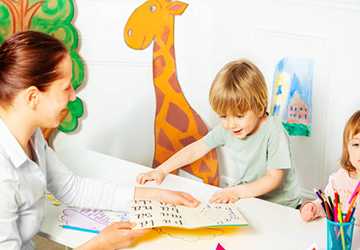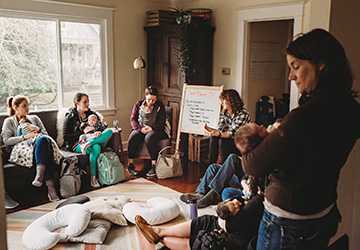Early Literacy- Building Blocks for Reading
Early literacy emerges as the quintessential pillar within the child development domain, heralding the journey towards proficient reading and comprehensive learning. This discourse seeks to elucidate the importance of early literacy, explore methodologies for encouraging reading in neonates, and outline early reading milestones. By penetrating these dimensions, guardians and pedagogues can forge a formidable infrastructure for young minds' academic and intellectual ascents.

The Quintessence of Early Literacy
Early literacy transcends mere alphabetic recognition; it is an intricate tapestry weaving together many competencies from the nascent stages of life. These competencies encompass lexicon augmentation, narrative comprehension, and deciphering graphemes and phonemes. Early literacy is a beacon of cognitive evolution and linguistic mastery and the bedrock for an odyssey of enlightenment and curiosity.
Fomenting Literary Interest in Infants
Contemplating how to encourage reading in babies seemingly distant from engaging with textual materials necessitates immersive and consistent literary exposures. Strategies of merit include:
● Ritualistic oral reading sessions: The act of articulating narratives aloud to the youngest of audiences immerses them in the musicality and rhythm of language, thereby nurturing auditory comprehension and interpretative skills.
● Selection of high-contrast tomes: Literature replete with vivid contrasts and bold designs piques neonatal interest, stimulating visual acuity and developmental curiosity.
● Oral storytelling endeavours: Beyond the confines of printed texts, oral storytelling or the verbalization of daily occurrences can significantly amplify their lexical reservoir and comprehension of the surrounding world.
Charting Early Reading Milestones
Identifying early reading milestones empowers guardians and educators to scaffold the literacy expedition of their charges adeptly. These milestones include:
● Phonemic awareness: The foundational literacy skill preceding formal reading involves the discernment and mimicry of linguistic sounds.
● Narrative arc comprehension: Toddlers gradually understand the structural elements of stories, appreciating their initiations, progressions, and denouements.
● Grapheme recognition: The embryonic stages of reading are marked by the ability to identify alphabetic symbols and simple lexemes, paving the way towards reading fluency.
Emboldening Early Literacy
The fortification of early literacy necessitates a fusion of pedagogical and engaging endeavours. Noteworthy methodologies encompass:
● Interactive literary engagements: Querying and dialoguing about the narrative during reading sessions cultivate interpretive acumen and critical contemplation.
● Literary alcove creation: Establishing a dedicated and inviting space for scholarly exploration, stocked with diverse texts, invites engagement and discovery.
● Exemplary reading practices: Demonstrating a commitment to personal reading in the presence of children encourages them to embrace literature as a habitual and enjoyable pursuit.
Navigating Early Literacy Developmental Hurdles
Even with the acclaimed importance of early literacy, impediments such as limited textual access or the challenge of integrating reading into daily routines can stymie literacy progression. Mitigatory strategies include patronage of libraries, exploration of audiobooks, and the institution of holy reading intervals.
The Influence of Digital Innovations on Early Literacy
The digital revolution proffers auxiliary channels to bolster early literacy. While educational software and e-literature can serve as efficacious adjuncts when employed with discernment, it remains imperative to strike a harmonious balance with traditional literacy modalities to foster a holistic literary upbringing.

Nurturing a Rich Literary Habitat
Augmenting the Verbal Terrain
Amplifying a child's milieu with a vast spectrum of vernacular and syntactical forms is imperative. Each novel lexeme and intricate sentence construction a young mind encounters significantly bolsters their linguistic arsenal. Participating in dialogues laden with elaborate descriptions and nuanced complexities broadens this verbal expanse, paving a pathway toward refined comprehension skills and the capacity for eloquent expression.
The Virtues of Sensory-Rich Learning
Adopting sensory-enriched methods for introducing literature brings children into the realm of books through avenues beyond mere visual and auditory stimuli. Interacting with books featuring tactile elements, delineating alphabets, and indulging in activities that engage gustatory and olfactory senses (like perusing a narrative about orchards while sampling various fruits) profoundly strengthens a young reader's bond with literature. Such encounters solidify the linkage between the lexicon and its significance, fortifying retention and recollection.
Reimagining Narrative Engagement
Digital Narratives as a Portal
The emergence of digital narrative mediums presents fresh methodologies to enchant young minds. Interactive digital books that react to a learner's input, tales that can be personalized with a child's denominative and predilections, and applications facilitating narrative creation by children themselves cultivate a sense of proprietorship and enthusiasm for literature. These technological avenues afford children access to various cultural narratives, dialects, and thematic material, fostering a spirit of inclusivity and empathetic connection through storytelling.
Play-Based Story Craft
Embedding narrative creation within play introduces a distinctive strategy for literacy advancement. Dramatic enactments, marionette theatrics, and narrative-driven games incite children to construct their own stories, navigate through diverse viewpoints, and employ language with inventiveness. This playful narrative craft amplifies linguistic prowess and nurtures analytical cognition and strategic thinking.
Cultivating a Literacy-Rich Community
Initiatives for Community Literacy
Participation in communal literacy endeavours significantly propels a child's journey in reading. Public libraries often organize narrative sessions, literary challenges, and reading circles tailored for burgeoning readers, crafting an atmosphere that celebrates literary accomplishments. Communal gatherings focused on literature and storytelling, including meetups with authors and cultural narrative events, further deepen a child's literary experience, linking the act of reading with collective happiness and learning.
Tailoring Literary Experiences
Books tailored to mirror a child's personal world, interests, and familial backdrop profoundly influence their reading motivation. Stories spotlighting the child as a protagonist heighten engagement, rendering the reading venture intensely pertinent and stimulating. Educators and parents may craft or commission narratives that resonate with a child's curiosity, hurdles, and aspirations, interlacing their tangible experiences with the fabric of literary quests.
Conclusion
The importance of early literacy permeates beyond the initial stages of life, influencing academic prowess and a lifelong zeal for knowledge. By mastering techniques for encouraging reading in babies and pinpointing early reading milestones, custodians and pedagogues can guide their protégés towards evolving into confident and literate individuals. Each shared narrative, every leaf turned, enriches the intricate narrative of a child's literacy journey, affirming early literacy as the indispensable cornerstone for mastering the art of reading.











